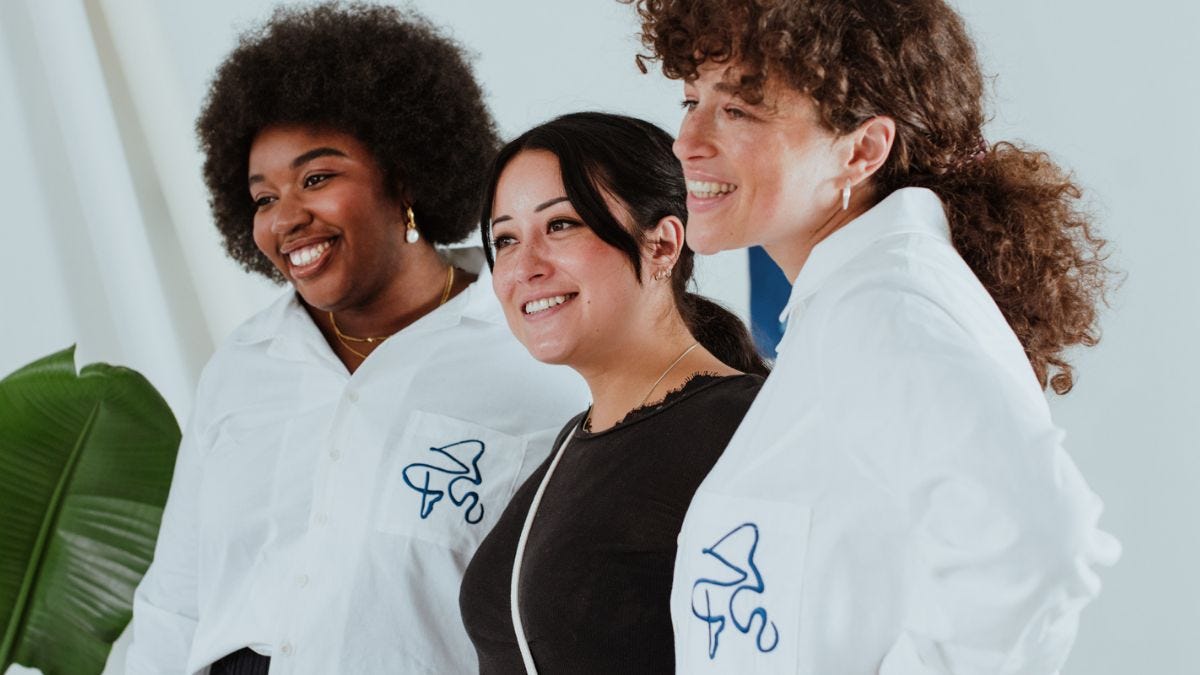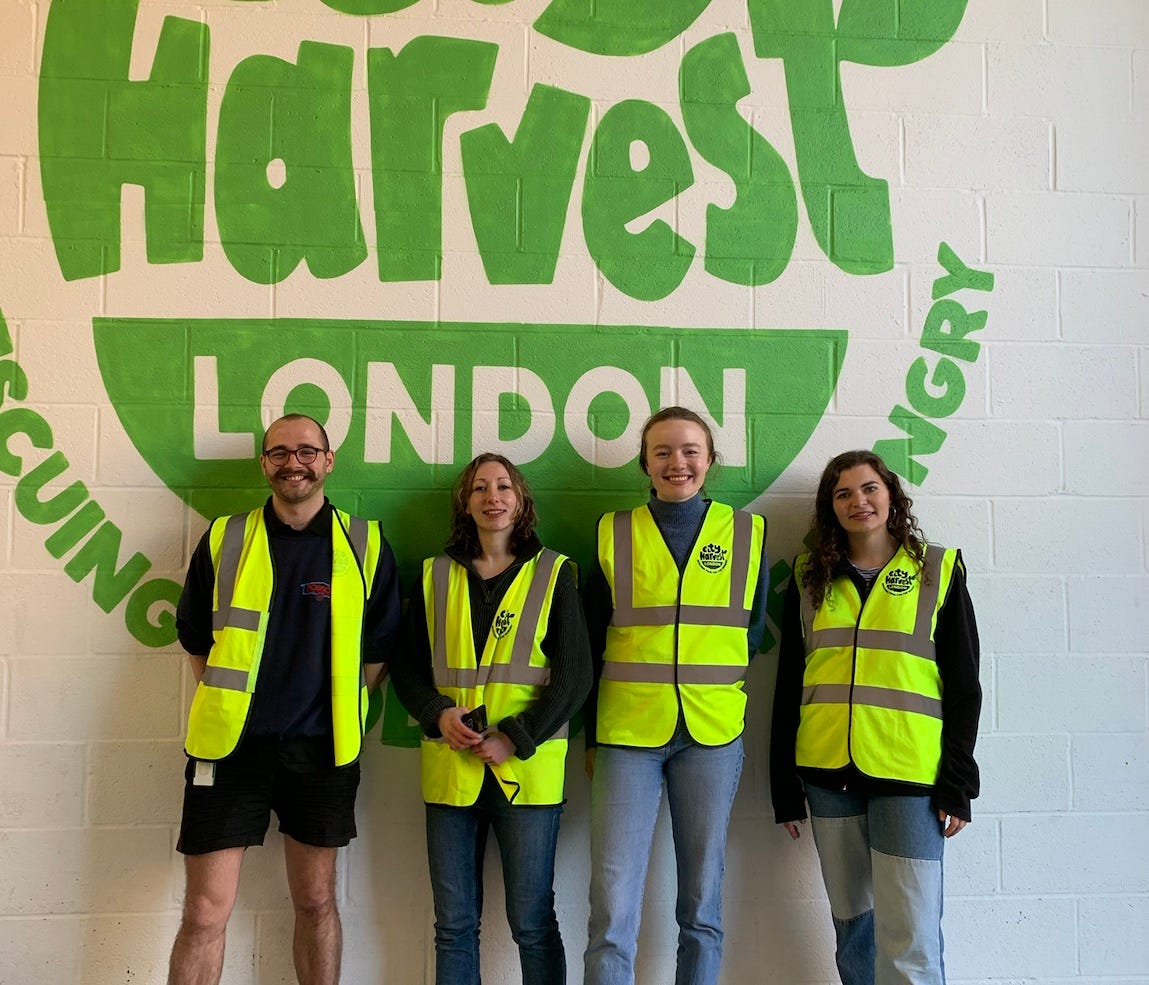🌱 People Power: 5 key benefits of Corporate Volunteering Platforms, and saying goodbye to Birdsong.
Featuring Tails, Birdsong, Fresh Del Monte, Waitrose and more...
Happy Monday!
This week we cover:
Quick Take: Corporate Volunteering Platforms: 5 key benefits over traditional methods of volunteering management
Brand Spotlight: Birdsong: Statement fashion, but not as you know it.
In case you missed it: Employer-Supported Volunteering: A step by step guide to secure it, and our day at City Harvest London.
> Good News Last Week
🎯 Doppelganger developed Chitofoam, a new packaging material to replace Styrofoam which makes up 30% of all landfill. The 100% biodegradable material made from chitin, a biopolymer in the exoskeleton of mealworms and lobsters.
🎯 Tails.com began a trial of a 9 day fortnight, taking every other Friday off without a reduction in pay of leave allowance. The trial aims to improve productivity, rest, headspace and reduce stress, sick days and carbon emissions.
⭐️ Waitrose announced a switch of 3 million small glass wine bottles to aluminium cans by next week, joining brands including The Uncommon on the shelf. The move will save more than 300 tonnes of glass packaging and halve the carbon footprint per drink due to the aluminium packaging taking up less space and being lighter, therefore requiring less energy during transportation.
⭐️ Unilever launched a new delivery pilot in partnership with Too Good To Go, delivering surplus brands directly to the consumer’s door in the Netherlands. The pilot will give direct access to consumers who cannot collect at designated times or locations and work towards Unilever’s commitment to halve food waste across all operations from factory to shelf by 2025.
⭐️ Fresh Del Monte debuted carbon neutral pineapples, Del Monte Zero, through carbon insetting. Certified by third-party group SCS Global Services, carbon neutral status was achieved as the emissions created in the pineapples supply chain, including growing and shipment from Costa Rice to the U.S, were negated through carbon sequestration at the company’s 8 farms by increasing carbon storage on their land while minimising GHG emissions.
⭐️ Vogue created a Global Sustainability Directory, a global guide of activists, designers and businesses that embrace repair, rewear and reuse to help extend the life of garments. The directory includes textile recycling, conscious shopping and resale retailers.
⭐️ Aldi extended their partnership with Company Shop Group to recover excess stock from Aldi’s network of Regional Distribution Centres. This will be sold at a discounted price in Community Shop stores as a way to help those in need, and will save an estimated additional 2,860 tonnes of food from being wasted, annually.
⚡️ Non-profit law firm Client Earth sued Danone (Evian, Activia, Volvic). The FMCG brand is among the top 10 polluters of plastic and is being taken to court for not complying with the French law that demands companies track, acknowledge and mitigate the impact their operations have on the environment, health and human rights.
⚡️ Single-use plastic banned in England, following Scotland and Wales, to remove 1.1 billion single-use plastic plates and 4 billion pieces of plastic cutlery from landfill, annually. Environment Secretary Thérèse Coffey said the move would help protect the environment for future generations.
> Click on each link to read more.
> Quick Take
Corporate Volunteering Platforms: 5 key benefits over traditional methods of volunteering management
Let’s start with a question: If you have ever volunteered, either in or out of work, how did it make you feel? Happy? Fulfilled? Grateful? Nice, that’s what we were hoping for. And it’s not just hope, it’s fact…
According to a 2021 UK Study in the Journal of Happiness, people who volunteer are generally more content, empathetic, and have higher satisfaction and success in both work and personal life.
That’s not all, evidence suggests that volunteering has a whole host of far-reaching benefits. The Chartered Institute of Personnel and Development (CIPD), details benefits ranging from the individual, to the community, from short to long term. Half of our Following the Footprints team got to experience this first-hand at City Harvest last April. You can read all about our experience, and our take on Employee-Supported Volunteering (ESV) here.
Beyond being a 'nice to have', there's plenty to suggest that the adoption of ESV can be a smart strategic move for businesses. The “S” pillar of ESG is a powerful tool to make positive impact inside and outside of business. So, we’re taking a moment here to understand how the rise of volunteering platforms and apps may help businesses achieve this.
Corporate Volunteering Platforms (CVPs) are online management tools that help businesses manage their employee volunteer programs. They follow a simple yet effective model: employees receive individual app logins, which they can use to book meaningful volunteering opportunities themselves, either to charities of their choice, or corporate partners. Businesses can then track and report hours, team engagement and impact through dashboards, whilst removing the time and effort in organising days or events internally.
CVPs have five key benefits over traditional methods of volunteer management*:
*We did a bit of our own primary research on this, asking employees, businesses and charities that use platforms, as well as secondary research too.
Higher rates of engagement and uptake, resulting in higher productivity and retention rates
Higher employee retention & ENPs scores, resulting in lower attrition rates and higher employee satisfaction
More opportunities for employees to gain transferable hard and soft skills, including leadership, communication, collaboration, confidence, and empathy
Time saving. Apps and software remove a significant amount of internal time spent on logistics, planning and organising events. We also found this was the main benefit for charities on the other end of the workflow too.
Ability to gather data & insights, resulting in even more uptake and motivation, as well as an understanding of barriers and limitations.
Whilst CVPs may be less useful for smaller workforces and/or, single location companies - they can be costly and can reduce the sense of team building and connectivity - they do work well for big organisations with multiple sites, markets and a large workforce. They are also incredibly useful for charities, raising awareness, reaching a higher database of potential volunteers and freeing up time otherwise spent planning volunteer shifts and workloads.
So, if you want to make 2023 the year your business improves volunteering and engagement, we’d recommend checking out this comparison article, and companies such as Do IT, Matchable and Better Impact to get started.
> Brand Spotlight
Birdsong: Statement fashion, but not as you know it.
Sometimes, it’s not the loudest voices that drive the biggest changes. Sometimes, it’s the quiet, purposeful care of every choice, every conversation and every stitch of the needle. With their ‘not-so-everyday’ fashion, Birdsong are proof positive of this. Last week, the brand announced they’re shutting shop. A trailblazer of a team, we wanted to take a look at what made them so different, and what other brands can learn.
The mission:
Birdsong’s 2021 impact report lays out the facts plain and simple:
Birdsong didn’t just protest against the exploitative nature of fashion, but illustrated how the industry can be a powerful means of economically empowering women. In their own words, their mission was to use their brand to inspire and implement change in the fashion industry. Let’s take a closer look.
The action:
Birdsong worked a made-to-order model. A product was released every few weeks, with customers able to pre-order and personalise through colour choices and tailoring, all crafted by skilled workers.
Such small batch fashion, a purposeful move away from the high-waste, high-emission (to the tune of 1.2bn tonnes CO2e per year) fast fashion industry, is starting to attract attention. You can check out our own take on Paynter Jackets, another great example, here.
What made Birdsong stand out from the crowd, however, is not just the way the clothes were produced, but who was producing them.
The difference:
Birdsong exclusively worked with women facing barriers to employment, providing them with the London Living Wage. Fabrics were sourced from individuals they know by name under ‘stringent conditions’, then crafted by skilled workers in women’s organisations like Tower Hamlets based enterprise Stitches in Time. Through these partnerships, Birdsong didn’t just provide a stream of income, but the opportunity for individuals to build their future and a sense of community in the process.
Co-founder Sophie Slater is clear that creating social change at every stage of the supply chain was their “reason for being”. The fact that Birdsong channelled an astonishing £100,000 of their profits to women’s organisations has left them an impressive legacy.
You can meet some of these women and read their stories here.
Redesigning, Reusing with ReLondon:
Alongside careful material choice, Birdsong found a way to embed environmentally responsible practices into their existing business model. Through a partnership with ReLondon, Birdsong identified another source of revenue for their makers with an innovative new repair service.
Following a trial to identify exactly what the customer needed, and armed with the insight that what women really want is convenient postage, Birdsong worked with logistical partners Repack, Schwap and Sojo to launch a repair and reuse pilot. The result? 10kg of clothes saved from landfill in just 6 months and another revenue stream for their makers. Learn more about the trial (and, vitally, lessons they learned along the way) here.
When Birdsong was founded, they were told they “‘can’t have ethical clothes and help women’s organisations and have unconventional models”’. Eight years in, their founders have been named on Forbes’ 30 under 30, they’ve won a Marie Claire Sustainability Award and a Queen’s award for Sustainable Development. Whilst we’re sad to see the doors shut on a brilliant brand, the impact they’ve had will be felt by generations of women and under-represented groups, a tribute to their vision of an alternative future in fashion.
Learn more about Birdsong’s mission:






